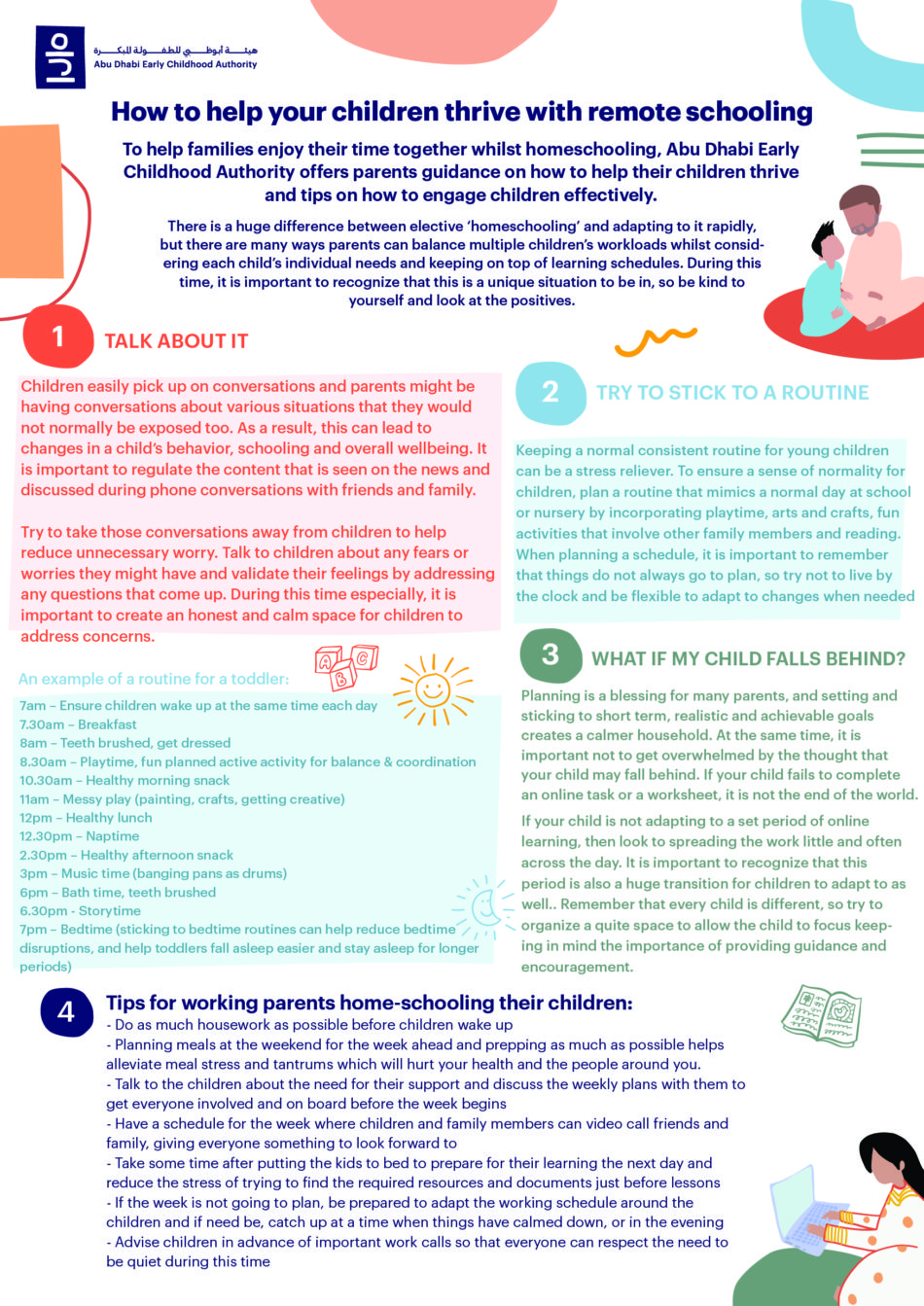As a result of the current situation, families are facing extended periods of social distancing. To help families enjoy their time together, Abu Dhabi Early Childhood Authority offers parents guidance on how to help their children thrive at remote schooling and tips on how to engage children effectively.
There is a huge difference between elective ‘homeschooling’ and adapting to it very unexpectedly, but there many ways families can balance multiple children’s workloads whilst considering each child’s individual needs and keeping on top of learning schedules. During this time, it is important to recognise that this is an abnormal situation to be in, so be kind to yourself and look at the positives in every situation.
TALK ABOUT IT
Children easily pick up on conversations and uncertainty parents might be experiencing. As a result, this can lead to changes in a child’s behaviour, schooling and overall wellbeing. It is important to regulate the content that is seen on the news and discussed during phone conversations with friends and family.
Try to take those conversations away from children to help reduce unnecessary worry. Talk to children about any fears or worries they might have and validate their feelings by addressing any questions that come up. During this time especially, it is important to create an honest and calm space for children to address concerns.
TRY TO STICK TO A ROUTINE
Before any routine, it is important to take a step back and consider how easy it will be to stick to. Keeping a normal consistent routine for young children can be a stress reliever. To ensure a sense of normality for children, plan a routine that mimics a normal day at school or nursery by incorporating playtime, arts and crafts, fun activities that involve other family members and reading. When planning a schedule, it is important to remember that things do not always go to plan, so try not to live by the clock and be flexible to adapt to changes when needed.
An example of a routine for a toddler:
- 7am – Ensure children wake up at the same time each day
- 7.30am – Breakfast
- 8am – Teeth brushed, get dressed
- 8.30am – Playtime, fun planned active activity for balance & coordination
- 10.30am – Healthy morning snack
- 11am – Messy play (painting, crafts, getting creative)
- 12pm – Healthy lunch
- 12.30pm – Naptime
- 2.30pm – Healthy afternoon snack
- 3pm – Music time
- 6pm – Bath time, teeth brushed
- 6.30pm – Storytime
- 7pm – Bedtime (sticking to bedtime routines can help reduce bedtime battles, and help toddlers fall asleep easier and stay asleep for longer periods)
WHAT IF MY CHILD FALLS BEHIND?
Planning is a blessing for many parents, and setting and sticking to short term, realistic and achievable goals creates a calmer household. At the same time, it is important not to get overwhelmed by the thought that your child may fall behind. You can do some trials and ask an expert to find the right balance and the suitable environment that will improve you child’s skills.
If your child is not adapting to a set period of online learning, then adapt to spreading the work little and often across the day. It is important to recognise that this period is also a huge transition for children to adapt to as well. Children may also be facing anxieties, so it is important to not add to them by setting overly high expectations during this abnormal situation.
Tips for working parents home-schooling their children:
- Do as much housework as possible before children wake up
- Planning meals at the weekend for the week ahead and prepping as much as possible helps alleviate meal stress and tantrums which will hurt your health and the people around you.
- Talk to the children about the need for their support and discuss the weekly plans with them to get everyone involved and on board before the week begins
- Have a schedule for the week where children and family members can video call friends and family, giving everyone something to look forward to
- Take sometime after putting the kids to bed to prepare for their learning the next day and reduce the stress of trying to find the required resources and documents just before lessons
- If the week is not going to plan, be prepared to adapt the working schedule around the children and if need be, catch up at a time when things have calmed down, or in the evening
- Advise children in advance of important work calls so that everyone can respect the need to be quiet during this time
Children represent the future. Encourage, support and guide them.







